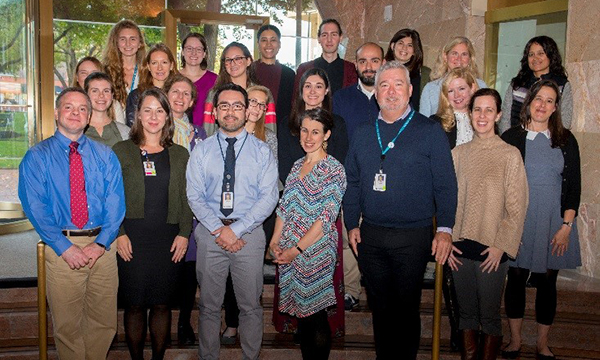About the Program
The Behavioral Medicine Program (BMED) at Massachusetts General Hospital provides specialized care at the intersection of psychology and health for patients impacted by both medical and psychiatric conditions through clinical work, professional training, and research.
Since the program's founding by Steven A. Safren, PhD in 2004, the treatment programs and research conducted by the Behavioral Medicine Program have emphasized the use of validated, state-of-the art treatment interventions based on the latest research to help patients reach their best levels of mental and physical health.
The BMED Program specializes in providing cognitive behavioral therapy-based interventions that are typically short-term, skills-based and tailored to the patient's individual needs.
Our Mission
The mission of the Behavioral Medicine Program is to enhance the lives of our patients, staff, fellows, faculty, and colleagues through the practice of the highest quality clinical research, informing the delivery of state-of-the-art clinical services, within a nurturing, collegial and mentored training and work environment.
Who We Serve
Referrals to the BMED Program are typically received for the following types of patients:
- Patients with chronic illness and a mental health condition (e.g., depression) who would benefit from cognitive behavioral therapy interventions.
- Patients experiencing distress that may be affecting their health (e.g., a patient with a cardiac condition who may benefit from stress management).
- Patients who may need help coping with an acute or chronic medical condition (whether or not they have a psychiatric diagnosis). For example, treatment may target adjusting to a new diagnosis, improving self-care or increasing adherence to medical treatment.
- Patients who would like support in changing behavior to prevent an illness or disease.
Our Treatment Model
Cognitive behavioral therapy (CBT) is one of the primary treatments applied within the BMED Program. CBT focuses on helping the individual develop personal coping strategies with the goal of solving current problems and changing unhealthy patterns of thought, behavior, and emotion. While it was originally developed for the treatment of depression, CBT has proven highly effective for treatment of mental health conditions across many medical diagnoses.
The BMED Program has extensive experience in applying CBT to medical conditions such as HIV, diabetes (types 1 & 2), cancer, epilepsy, pain, and sleep problems. Our faculty also conduct clinical research aimed at developing new treatments and expanding our understanding of how to improve the way current treatments are applied.
What You Can Expect from Treatment
Treatment typically begins with an initial evaluation with your doctor over one or two visits. Once the evaluation is completed, the patient and provider will discuss treatment goals and a plan for achieving these goals.
The length of treatment varies but typically lasts from 8 to 16 weekly sessions. Providers in Behavioral Medicine regularly coordinate care with other Mass General providers involved in the patient's care.
A Collaborative Approach to Care
The BMED Program works closely with other medical departments within Mass General including (but not limited to):
Our Research
The BMED Program is at the forefront of research focused on developing, validating and disseminating psychosocial interventions to help individuals with a variety of health and medical issues. We conduct research both domestically and internationally across three continents. To learn more about the specific projects we are currently conducting or to learn about enrolling, please visit our Behavioral Medicine Research page.
Read more




